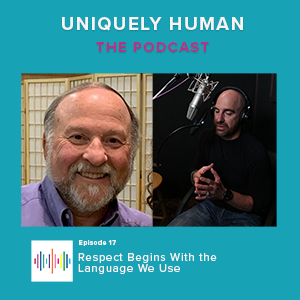
EPISODE 17
Respect Begins With the Language We Use
Respect Begins With the Language We Use
Play the Episode…
…and Continue the Discussion
Do you have a book or podcast club? If so, you may use this discussion guide to facilitate a conversation about this episode.
1) Historically, professionals have referred to language characteristics of autistic people using terms such as deviant, irrelevant, and non-communicative. These descriptions were first used in the clinical and research literature, while parents and those close to autistic people often found meaning in their language. Why do you think this dichotomy existed for so many years—and still does to some extent?
2) Reframe/challenge the following descriptions of autistic people, and provide more accurate descriptions: They are rude and too direct. They are non-compliant, controlling and inflexible. They talk only about their interests and don’t shift to topics you are interested in. How might autistic people feel when they are characterized by such descriptions?
3) Barry suggests a number of strategies to use when confronted with people who continue to use language that is disrespectful and judgmental to autistic individuals and families. Discuss some of these approaches. If you have used or observed others use additional strategies to change such language, please describe.
Show Notes
The language used in autism culture has a profound impact on perceptions of autistic people and family members. It can communicate respect, or cause mistrust. We discuss the importance of scrutinizing the language we use, and then recommend actions to make the language culture of autism more accurate and respectful, rather than judgmental.